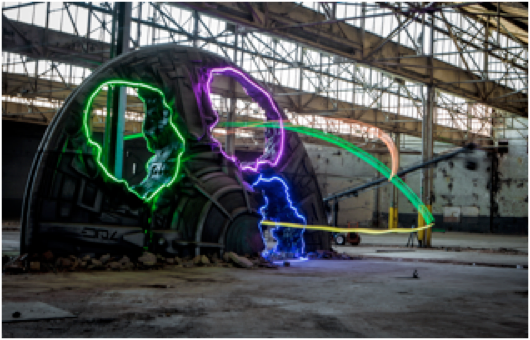The Big Buzz: Drone Racing Goes National
Drone Racing League (DRL) inks deals with ESPN, Sky, 7Sports
Story Highlights
Ladies and gentlemen, start your engines. All six of them.
Drone racing takes off in October and may mark another inflection point in the evolution of broadcast sports as virtual and physical domains converge to create another piece in the emerging picture that will be sports in a videogame world.
The Drone Racing League (DRL) last week announced multiyear international event and media-distribution agreements with ESPN (in the Americas), Sky (UK and Ireland), and 7Sports, the sports division of German media company ProSiebenSat.1 Media.

Featuring complicated courses in a variety of venues, drone-race competitions will be postprocessed into hour-long packages.
Airing as 10 one-hour episodes, the 2016 DRL season covers five races, including a winner-take-all world championship to crown the best drone pilot. DRL will also partner with MGM Television to develop unscripted shows, executive-produced by reality producer Mark Burnett, exploring the world of DRL, its pilots, and technology, allowing existing fans to get a deeper look at the league while bringing new fans to the sport.
Starting next month, the broadcasts will air on ESPN/ESPN2 and will feature 25 of the fastest FPV pilots from more than eight countries competing for a professional contract in the 2017 season and the title “World’s Greatest Drone Pilot.”
Small and Fast
DRL founder/CEO Nicholas Horbaczewski describes the challenges of getting a new sport on the air — literally. “It took over a year to figure out the best way to do drone racing as a television sport,” he says, crediting DRL Head of Media Tony Budding with much of the strategy. “You’re talking about capturing something the size of a dinner plate going 80 miles per hour over a complicated course. It’s never been done before.”
The courses are set up in a variety of locations; drone racing may be years away from its own arenas. These include an abandoned mill in Los Angeles, a former paper factory in Ohio, a closed Cadillac metal-stamping plant in Detroit; and the former Bell Labs office building outside New York City. The first race, “Miami Lights,” from Sun Life Stadium, will be shown Sunday Oct. 23 at 10 a.m. on ESPN2.
Horbaczewski says issues around this peripatetic venue journey include finding sufficient power sources onsite for what is a substantial amount of kit for the races. Generators and other heavy equipment are being sourced by Hertz Equipment Rentals. Location production is done by several remote-production companies, all with their own substantial sports-broadcast bona fides, including Kodiak, NEP, and Lyon Video. As many as 50 cameras are used on the races. These include numerous GoPro cams fitted on the drones themselves and along the course and the same Spidercam and Cablecam platforms used at NFL games. Two Red Dragon high-speed cameras are also used to create slo-mo shots in postproduction.
Shotgun microphones are laid out around the courses. A field reporter uses a handheld microphone and is followed by handheld video cameras during visits to the pilots’ area, where the drone jockeys fly as many as six aircraft through wireless video connections through three-dimensional obstacle courses.
Postproduction
However, unlike most broadcast sports, DRL races won’t be shown live, nor will they be streamed. Instead, the footage will be postproduced and edited into one- and two-hour race packages for broadcast.
Aside from the difficulty in maintaining a visual narrative of such small and fast objects — “The amount of video switching you’d have to do would be enormous to show this live,” Horbaczewski says — drone racing has perceptual expectations to overcome. He notes that market research revealed that many potential viewers expected to see something similar to podracing, a “sport” they first encountered in Star Wars: Episode I The Phantom Menace.
“That was all CG, and it cost millions of dollars to produce,” Horbaczewski points out. “That’s the perceptual bar we had to meet. But it did help us shape our ideas for bringing this to television and determining what equipment we’d need to make it compelling viewing.”
Commentary will be added as voiceover in post, along with comments from pilots recorded before, during, and after the races. Audiences, protected by netting, will be brought into each venue, with crowd-reaction sound captured by microphones along the audience areas. Sound will play a big part in the DRL broadcasts, according to Horbaczewski, with the drones’ own modified engines adding more “roar” than the buzz that usually accompanies drones.
“You get a lot of information about the direction and speed of the drones from their sound,” he explains, adding that audio will be available in stereo and 5.1 surround. “In that way, it’s very similar to F1 and NASCAR, except that a drone can change direction and speed in an instant; there are no curves on these courses. We’ve invested a lot in sound capture for the races. It’s like nothing you’ve ever seen or heard before. Ever.”
